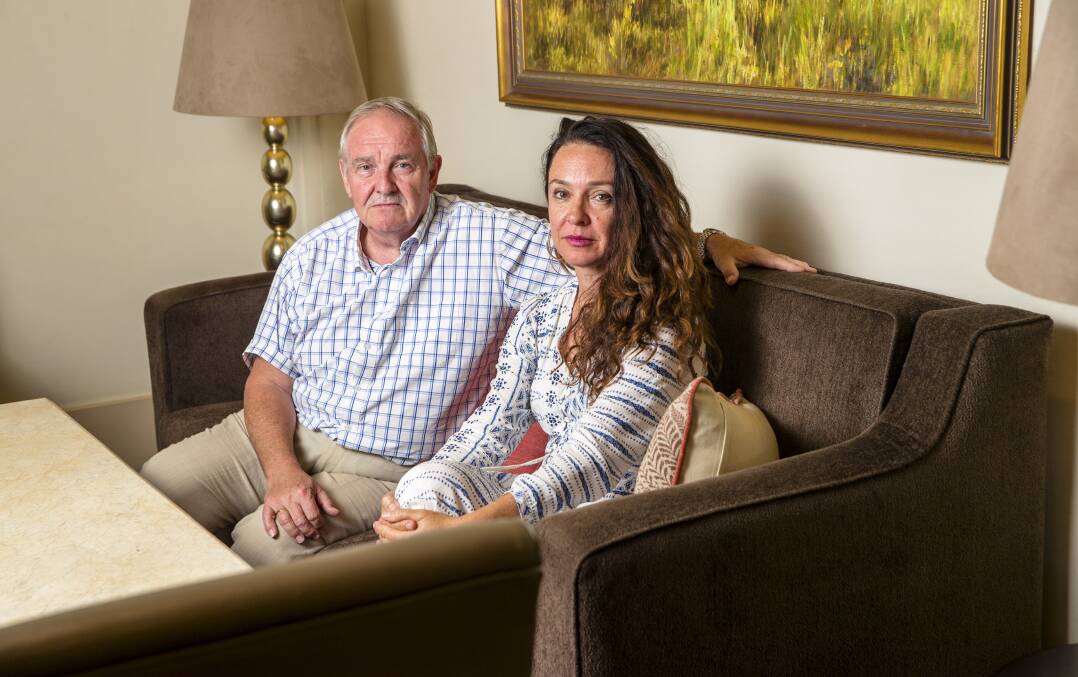
When Vanessa's husband, Franco, came down with a severe form of depression four years ago she tried everything she could to save her husband's life.
"I spent the next three years taking him to every leading professor who I was told to go and see in Sydney," she said.
"He was hospitalised seven or eight times and was in hospital for a total of 19 months and he was on 19 different anti-depressants, antipsychotics, which all have their side effects, some worse than others.
"He had 96 electric shock therapies during that time."
However, there was one thing Vanessa was barred from doing.
Through her desperate attempts to help her husband, she became aware of the work of English neuropsychopharmacologist David Nutt.
Professor Nutt, from the Imperial College London, is a strong advocate for the use of psychedelic-assisted therapies to treat mental illnesses. He has previously argued the risks of horse riding are higher than those associated with MDMA.
"There's a ridiculous resistance to accepting the fact that psilocybin and MDMA are revolutionary treatments which should be available now to save people's lives," he said.
"I've done a lot of research on how these drugs work and with depression with psilocybin, we now know it works in a completely different way to traditional drugs."
Research has found psychedelic therapy can help to alter the chemical composition of a person's brain to provide perceptual changes. Some studies have shown the therapy to have an immediate change in people with depression.
Professor Nutt is in Australia to advocate for the use of psychedelic-assisted therapies along with Mind Medicine Australia, a charity which is working towards regulatory-approved and evidence-based psychedelic-assisted therapies.
He is giving talks around the country as part of this and was also in Canberra this week where he met with the Therapeutic Goods Administration and federal Health Minister Mark Butler.
The Therapeutic Goods Administration is being urged to consider rescheduling drugs such as MDMA and psilocybin so they can be used to treat mental illnesses.
The administration has already made an interim decision to reject this reclassification but Mind Medicine Australia is hoping to change the minds of decision makers.
In its interim decision, the TGA said it was of the view there was insufficient evidence of the therapeutic value of the drugs. It said both drugs were associated with a range of risks and it would be beneficial to wait for the results of further trials.
"The currently limited evidence of benefit for both substances is outweighed by the risks to patients and public health from any increased access," the interim decision said.
The CSIRO is conducting a study into psychedelic therapy. Some researchers have said while results are promising a lot more needs to be done to understand how the drugs work.
The Royal Australian and New Zealand College of Psychiatrists clinical memorandum on psychedelic substances said further research is needed to "assess the efficacy, safety and effectiveness of psychedelic therapies". The college said, at present, it should only be used under research trial conditions.
The ACT government is considering legislation changes to allow psychedelic-therapy to be used to treat post-traumatic stress disorder and depression.
ACT legislation currently applies the decision of the Australian Therapeutic Goods Administrations. The administration can approve the use of psychedelic therapies under a special access scheme but there is no allowance for that approval in the territory's laws meaning it cannot be administered.
Vanessa, who is from Sydney, tried for months to get access to psychedelics.
"It took me eight months of investigating it relentlessly and trying to see if I could find a psychiatrist that was willing to try and get, on compassionate grounds, access to this treatment because otherwise I was losing my husband," she said.
"We can get access to MDMA and psilocybin through compassionate grounds but what we can't do state-by-state is actually administer it so there is no where in Australia where a state will allow you to take those drugs and yet they're available everywhere.
"Because I am a conscious citizen, I didn't want to break the law and in the end the consequences were that my husband took his own life."
Professor Nutt said the decision to deny access to these drugs as treatment was "criminal" and "sadistic". He is not arguing for the drugs to be available for recreational use but said they have been banned based on "myths, dishonesty and untruths".
"We're not talking about recreational use, we're talking about medical use in medical practice. It's almost inconceivable there are going to be any harm in these drugs at all," he said.
"We're not recommending the wholesale availability of these drugs on street corners we are saying in controlled clinical settings with healthcare professionals that have expertise and training, they should be available to help people like Vanessa's husband who has failed on all the other treatments that are more harmful to him than these treatments.
"It is perverse to deny that access simply on fulfilling some historic misunderstanding about harms or some traditional agenda of the war on drugs."
- Support is available for those who may be distressed. Phone Lifeline 13 11 14; Mensline 1300 789 978; Kids Helpline 1800 551 800; beyondblue 1300 224 636; 1800-RESPECT 1800 737 732.
We've made it a whole lot easier for you to have your say. Our new comment platform requires only one log-in to access articles and to join the discussion on The Canberra Times website. Find out how to register so you can enjoy civil, friendly and engaging discussions. See our moderation policy here.







